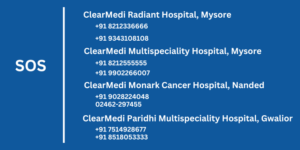Introduction
Cancer continues to be one of the greatest challenges to global health, affecting millions of people all over the world. Cancer, in brief, refers to a group of diseases that occur due to the uncontrollable growth of abnormal cells with the potential to spread or invade the other parts of the body. It is a serious medical condition which can also lead to life-threatening outcomes.
Cancer can develop due to a variety of factors, including lifestyle factors and environmental exposure, but the role of genes is also increasingly significant. People need to be aware of the hereditary risk factors of cancer to ensure early detection, prevention, and, in advanced cases eff, effective diagnosis and treatments. ClearMedi Healthcare, as the leading Cancer Hospital in Mysore, provides advanced treatments with innovative techniques and the dedication of expert doctors.
Risk Factors of Hereditary Cancer
Cancer affects the quality of life of people and deteriorates their health to a disastrous level. The hereditary factors in the development of cancer are mostly unavoidable. Still, people need to have a detailed understanding of the risk factors for early detection and prevention of the disease. The various risk factors are as follows:
- Family History: According to the renowned Cancer Hospital Mysore, ClearMedi Healthcare, individuals with a family history of certain types of cancer, especially if the disease is diagnosed at a young age, have a higher risk of developing cancer. Moreover, suppose there is a pattern of the occurrence of cancer in the family, like multiple relatives developing the same or similar types of cancer. In that case, it can lead to hereditary cancer.
- Specific Genetic Mutations: There can be an increased risk of the occurrence of cancer with specific genetic mutations like the mutations in the BRCA1 and BRCA2 genes can result in an increased risk of ovarian, breast, and other cancers. Moreover, mutations in genes such as APC, TP53, and MLH1 can lead to an increased risk of colorectal, Li-Fraumeni syndrome, and Lynch syndrome, respectively.
- Personal History of Cancer: Individuals who are diagnosed with certain types of cancers have an increased risk of developing additional cancers, and the risks increase even more where there is an involvement of hereditary mutations.
- Ethnicity: According to well-established hospitals providing effective Cancer Therapy Treatments, certain types of hereditary cancer syndromes are more prevalent in specific racial or ethnic populations. For example, the BRCA mutations of cancer are more common among individuals of Ashkenazi Jewish descent.
- Multiple Primary Cancers: Individuals who are diagnosed with multiple primary cancers, even if the conditions include different organs or tissues, are more likely to have an underlying genetic predisposition to cancer.
Detection of the Hereditary Cancer
Hereditary cancer cannot be prevented in all cases, but there are various measures that can be taken to reduce the risks of developing cancer, such as lifestyle modifications. The most important way to improve survival rates is to ensure the early detection of inherited cancer mutations and opt for impactful treatments. ClearMedi Healthcare, as the recognized Cancer Hospital in Mysore, advised people to go for genetic testing to detect and identify cancer.
Role of Genetic Testing
Genetic testing involves analyzing an individual’s DNA with a sample of biological material, such as saliva, blood, or tissue, and using various laboratory methods to identify the genetic mutations or variations that are associated with inherited conditions, including hereditary cancer syndromes. The Role of Genetic Testing can be defined as the following:
- Identification of Hereditary Cancer Risk: It helps to play a vital role in analyzing specific cancer-related genes to identify the mutations that can lead to an increased risk of the development of certain types of cancer in individuals.
- Personalized Risk Assessment: Genetic Testing facilitates personalized risk assessment by identifying the individual with genetic mutations associated with hereditary cancer syndromes. It can help the specialists to tailor the screening protocols and management strategies according to the genetic profile.
- Informed Decision-Making: As genetic testing provides individuals with detailed information about their cancer risks, they can make informed decisions about their lifestyle modifications. This may include going for frequent screenings, considering risk-reducing medications or surgeries and understanding the process and importance of Cancer Therapy Treatments.
- Family Planning and Counseling: People are advised to make family planning decisions after understanding the inherited genetic mutations that can lead to cancer, the implications of their decisions and the potential risks of hereditary cancer.
ClearMedi Healthcare: Make Informed Decisions to Deal with Hereditary Cancer
The first step to the prevention or treatment of any disease is to have an understanding of the same. In terms of hereditary cancer, it can be quite dangerous and, at the same time, in most cases, unavoidable. However, people can make informed decisions to prevent or detect the disease before it causes considerable damage. ClearMedi Healthcare, as the acclaimed Cancer Hospital Mysore, provides the advanced techniques to ensure early detection and, in advanced cases, effective treatments to improve the quality of life of people.
Also Read About:
Laparoscopic Surgeon in Mysore


